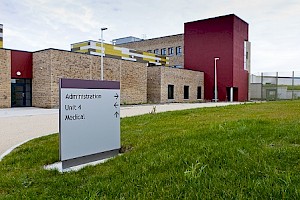Ireland has a long history of poor responses to offending behaviour by children. A core strand to IPRT's work since its establishment in 1994 has been the promotion of a more effective youth justice system, with emphasis on non-custodial alternatives, diversion, early intervention and prevention strategies and programmes. Central to our work was ending the practice of detaining children in adult prisons, which was in breach of international human rights standards and a serious stain on Ireland's human rights record.
International human rights standards, and in particular the provisions of the UN Convention on the Rights of the Child, are clear that custody for children should only be used as a last resort and for the minimum required period of time. All efforts should be made to apply alternatives to detention to ensure that such a measure is only used in exceptional circumstances.
In Ireland, the Children Act 2001 recognizes the principle of detention as a last resort. The Act prohibits the imprisonment of children and the Criminal Justice Act 2006 makes provision for all children less than 18 years of age to be detained in Children Detention Schools. The detention school model is focused on a model of care, education, health and programmes that address offending, with improved outcomes for the young people, their communities and all of society. The Irish Youth Justice Service is responsible for the Children Detention Schools, within the Department of Children and Youth Affairs.
Following years of sustained advocacy by IPRT, along with many national and international bodies, in 2012 the detention of boys aged under 17 at St Patrick's Institution ended. In March 2017, a Ministerial Order ended the sentencing of children aged under 18 to adult prison in Ireland, and in April 2017, St. Patrick’s Institution was finally closed. Since September 2017 boys aged under 18 are no longer detained in the adult prison system.
IPRT continues to work towards progressive change in youth justice policies and practice, as well as engaging with wider policy and practice issues relating to youth justice, such as the provision of alternatives to detention, diversion and early intervention programmes.


8th April 2025
In the RTÉ Prime Time segment titled "How the Lucky Dip gang is fuelling a car theft crisis," on 8 April 2025, Saoirse Brady, Executive Director of the Irish Penal Reform Trust (IPRT), discusses the broader implications of children in the criminal justice system and the solutions.

13th February 2025
In an article about child detention in Northern Ireland, which mentions other jurisdictions such as Scotland, Irish Penal Reform Trust Executive Director, Saoirse Brady, spoke to The Detail about child detention in the Republic of Ireland.
19th November 2024
On 19 November 2024, Irish Penal Reform Trust (IPRT) Executive Director, Saoirse Brady, attended and presented at the Youth Diversion Project Conference in Croke Park.
11th October 2024
This legislation will address an issue of unconstitutionality recently identified by the High Court in which the Court ruled that a child who commits murder but turns 18 years old before sentencing should not be subject to the mandatory life sentence for murder.
9th October 2024
MEDIA RELEASE: Irish Penal Reform Trust (IPRT) welcomes the publication of Health Information and Quality Authority’s (HIQA) most recent inspection report on Oberstown Children’s Detention Campus published today (9 October 2024) but highlights concerns noted in the report.
9th October 2024
The Health Information and Quality Authority (HIQA) has today, 9 October 2024, published an inspection report on Oberstown Children Detention Campus.
3rd July 2024
Oberstown has published its annual report for the year 2023. The report outlines a number of key developments made in providing care for young people in custody, in addition to progression pathways for those leaving the facility.
4th July 2023
Oberstown has published its annual report for the year 2022. The report outlines a number of key developments made in providing care for young people in custody, in addition to progression pathways for those leaving the facility.
18th January 2023
IPRT appreciates the opportunity to make this submission to the Department of Justice, as part of its public consultation on the topic of diversion paths for young adults aged 18–24. The Department’s...
15th August 2022
This IPRT submission to the UN Committee on the Rights of the Child makes 22 recommendations relating to child justice and children with a family member in prison in Ireland.




Respect for rights in the penal system with prison as a last resort.